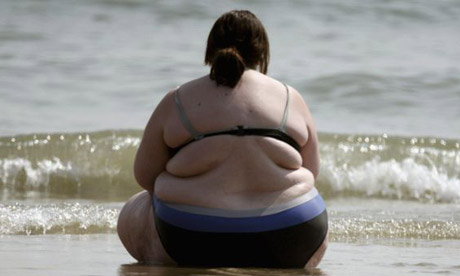

Genetics - Genes play a part in how your body balances calories and energy. Children whose parents are obese also tend to be overweight. A family history of obesity increases your chances of becoming obese by about 25 to 30 percent. Heredity does not destine you to be overweight, but by influencing the amount of body fat and fat distribution, genes can make you more susceptible to gaining weight. You cannot change your genetic makeup by willpower any more than you can make yourself taller or shorter by wishing. But you can still achieve your weight loss goals even with a family history of obesity.
Culture - People learn to eat and cook the way in which they were brought up. Food choices and combinations are learned very early in life. Social events and family rituals are often centered around large meals.
Today's culture promotes eating habits that contribute to obesity. People may serve large portions and foods that are most readily available instead of choosing foods that are most nutritious. Cooking with butter, chocolate and other high-caloric foods is a normal part of the American diet. Also, food is often used as a reward in this country. Children are treated to sweets for cleaning their room, and the team is taken for pizza or ice cream after the game. Seldom is eating only when hunger is present.
Physical Inactivity – Overweight people are usually less physically active than normal weight adults. Seriously overweight people may have difficulty moving. The additional weight can cause pain in the feet, knees and ankles. It can cause shortness of breath, making you feel tired quickly. Also, we have so many labor-saving devices now that it is difficult for people to get exercise in the amounts the body requires. For example, we drive to the corner store for a frozen dinner. We drive home, click the garage door opener and relax on the couch with the remote control. All these devices can keep us from physical activity.
Emotional or Psychological Factors - Food is often a source of solace or celebration. If we feel blue, we may turn to food. If we celebrate a new job or birthday, we may go out to a big dinner. If a friend is grieving, we bake them a pie. Often as children, parents told us to clean our plates. Food carries many significant memories from our past. Food may be your best friend. Food may become less important in your life after weight loss, especially if you have surgery. Weight loss will allow you to acquire new interests in your life and become more active and varied in your activities.
Gender - Muscle uses more energy than fat does. Men have more muscle than women, and burn 10 percent to 20 percent more calories than women do at rest. For this reason, women are more likely to be obese.
Age - As you get older, the amount of muscle in your body tends to decrease, and fat accounts for a greater percentage of your weight. This lower muscle mass leads to a decrease in metabolism. Your metabolism also slows with age. Together, these changes reduce your calorie needs. If your food intake is not adjusted, you will gain weight.
High-fat / High-Calorie Diet - Ounce for ounce, fat provides more than twice as many calories as protein or carbohydrates (nine calories for fat versus four calories for carbohydrates). This energy difference may explain how fat promotes weight gain. Yet even when caloric intake is the same, a person eating a high-fat diet tends to store more excess calories as body fat than someone eating a lower fat diet. Often low-fat foods are high in calories.
Medical Problems - Less than 2 percent of all cases of obesity can be traced to a metabolic disorder, such as low thyroid function or hormonal imbalances.
How To Prevent Obesity?
Be Active
Simple activities, such as climbing the stairs instead of using lifts, morning and evening walk in the park and swimming, can bring about tremendous changes in your lifestyle. Such activities will not only help you burn excess fat, but also help you stay active. Start doing light to moderate exercises for thirty minutes, five times a week. Switch over to the tough exercises, once you have gained stamina and strength. You may also join a health club or gym and socialize with like-minded individuals.
Keep A Check On Your Weight
Monitor your weight regularly. Weigh yourself at least once a week. This will help you figure out how much extra flab you have lost by doing simple activities or workout. In case you are being inactive and not eating healthy, you will be aware of the weight gain at an early stage. This will prevent your weight gain from being too much to get off.
Drink Plenty Of Water
Drinking lots of water will help your body detoxify all the impurities present in the system. Doctors recommend that you to drink at least 8-10 glasses of water a day. Having a glass of warm water in the morning, with half a lemon squeezed in it, is also a good idea. Remember, water cleanses and rejuvenates your skin as well.
Stay Away From Junk Food
One of the prerequisites of staying healthy is avoiding junk foods. The smart way to stay away from junk food is not to buy them at all! Avoid frequenting the fast food chains. Keep junk food out of your house as well. If you really like stuff like pizza and burgers, indulge in them not more than once or twice a month.
Eat Slowly & Only When You Are Hungry
Do not cut any of the three meals per day. Rather, divide them into small meals, stretched over a gap of 2-3 hours. At the same time, cut off high-calorie snacks in between the meals. Eat small portions of food and do not gulp them down. Do not stuff yourself with food when you are not hungry. Eat only when your body signals you to have food. Eat slowly because the stomach takes some time to feel ‘full’.
Diet
Your diet should be balanced, with fruits, vegetables and whole grains included in it. An obese adult should have at least five servings of low-sugar fruits and vegetables on a day. A vegetable serving shall include one cup of raw or one and half cup of cooked vegetables. One piece of fresh fruit and one and half cup of canned fruit are included in a serving of fruit. You should avoid fruits and vegetables that are high in calories, like mango.









2 comments:
obesity is one of the major health concerns and it is related to various diseases. Obese people are more sentimental and aggressive than others.
oh God! you made me lose my appetite, hehe..
Post a Comment